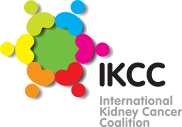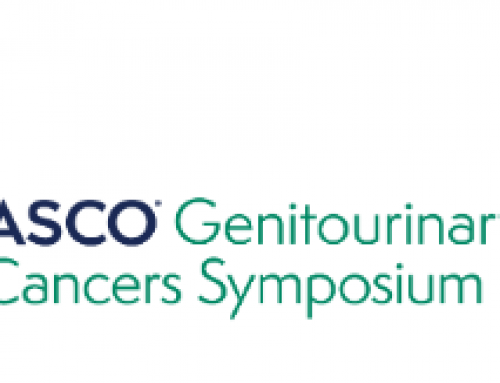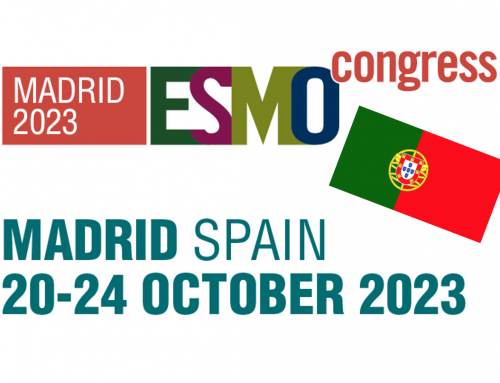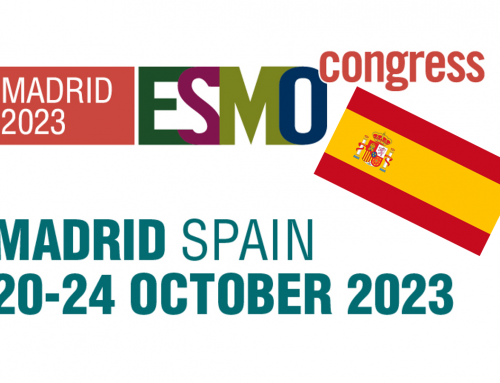Note: The following summary was prepared by patient advocates for the benefit of patient organisations who focus on kidney cancer. While this summary has been medically reviewed, the information contained herein is based upon public data shared at this meeting and is not intended to be exhaustive. Patients should ask their physician about any information that pertains to their care.

Summary of Kidney Cancer Take-Home Messages from ESMO 2018
Over 26,000 people attended the ESMO (European Society of Medical Oncology) meeting in Munich from October 19-23. The International Kidney Cancer Coalition was present with a booth to raise awareness and to also attend medical and patient advocacy sessions.
JAVELIN RENAL 101 (axitinib+avelumab vs sunitinib in 1st line mrcc)
Undeniably, from the kidney cancer point of view, the most talked-about presentation at ESMO 2018 was the JAVELIN 101 study. This is a large study testing the combination of the PD-L1 blocking immune oncology (IO) agent avelumab together with the blood vessel-starving (TKI) agent axitinib against the stalwart TKI agent sunitinib.
The key take-home message is that this combination resulted in a 13.8 month delay in tumor regrowth for all patients in the avelumab/axitinib combination compared to 8.4 months for sunitinib, and a 51 percent response rate for the avelumab/axitinib combination versus 26 percent for sunitinib. However, the complete disappearance of disease (complete response) occurred in only 3 percent of patients on the avelumab/axitinib combination and 2 percent in the sunitinib group. In addition, as of now, there is no increase in overall survival in the combination group, but the study data have not yet fully matured, and we need more time to see if a survival advantage emerges.
The good news from a toxicity perspective was the relatively low percentage of patients on the avelumab/axitinib arm who had major immune toxicities, with only 11 percent requiring high doses of a steroid antidote against these toxicities. On the other hand, more than 10 percent of patients had an infusion reaction (a short term, “allergic” reaction to the drug which very different from the more serious IO toxicities) while receiving avelumab which is much higher than comparable drugs like nivolumab (Opdivo) or pembrolizumab (Keytruda).
For the patient community, this represents a premature result, and we may need more time to see additional complete responses or a survival advantage. The more toxic ipilimumab/nivolumab treatment regimen has a higher complete disappearance rate and an overall survival advantage. The main advantage the avelumab/axitinib combination has over ipilimumab/nivolumab is that is shows a disease delay and response effect in all risk categories (good, intermediate and poor), whereas ipilimumab/nivolumab mainly works in the intermediate and poor risk groups.
One point that patient advocates should pay attention to is whether these combination therapies truly increase the cure rate or whether they simply result in a delay in progression. This is important because if it only inducing a delay in progression, the same or better results can be achieved using one drug after the other instead of in combination, with less toxicity and lower cost.
For further information click here: JAVELIN RENAL 101 results
ATLAS Adjuvant Study
The ATLAS trial examined the effectiveness of Axitinib versus placebo in trying to improve the cure rates for resected localized high risk renal cell carcinoma. Treatment was given for up to three years. The trial did not show any benefit from a relapse free survival (time lived without cancer coming back) perspective for a patient receiving axitinib after surgery. This study continues a nearly uninterrupted line of studies showing no benefit for administering TKIs in the preventative setting after surgical removal of the primary tumor in patients who do not have clear evidence of metastatic spread of their cancers, but are at higher risk for recurrence.
The only study that showed a delay in recurrence is the S-TRAC sunitinib study, which has resulted in a fairly weak recommendation for use by the National Comprehensive Cancer Network (NCCN) in the USA, and has been voted down by the European Medicines Agency (EMA) for use in this setting. We continue the search for effective adjuvant (AKA preventative) therapies in this disease setting.
For further information click here: ATLAS Adjuvant Study
Biomarkers-IMmotion 151 Study
We continue to look for biomarkers that can help us get to the goal of “precision medicine” in patients with kidney cancer, where we can match the right drugs to the right patient. A presentation describing the confirmation of a specific RNA (ribonucleic acid, the “messenger” that turns our DNA information into protein “machines” in our cells) signature that can categorize kidney tumors into angiogenic (blood vessel rich) or immune rich subcategories, and helps determine whether patients are more likely to benefit from a blood vessel starving TKI therapy versus IO therapy (or the combination of IO plus TKI therapy).
This work was done on the data generated in the IMmotion 151 study, which compared the combination of the IO agent atezolizumab plus the blood vessel-starving bevacizumab against sunitinib, a TKI. This study built on work that was done on the prior IMmotion 150 study testing similar treatment regimens.
For further information click here: IMmotion 151
What this means for patients is that we are getting closer to being able to predict which class of therapy is better for a particular patient, and can also help us to understand why some therapies don’t work in some patients. While not fully ready for prime time, these data make us optimistic that we are getting closer to developing a more personalized approach to treating patients with kidney cancer.
How to protect patients from Pseudoscience
In the Patient Advocacy Track, a session by Gilliosa Spurrier from Melanoma Patient Network Europe addressed the phenomenon of ‘fake news’ or pseudoscience in online patient forums with the suggestion that patient groups are best positioned to teach patients how to test for falsification and discuss evidence with their clinical team. The key themes were partnership, openness and shared-decision-making leading to better care, satisfaction and overall outcomes.
29th October 2018



